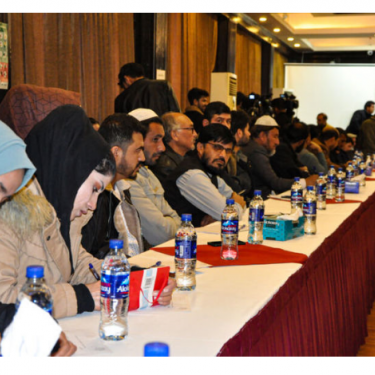Afghanistan: radio station owners discuss economic problems, self-censorship

Reporters Without Borders (RSF) backs the calls voiced by representatives of 85 provincial radio stations in Afghanistan in response to the problems they have encountered since the Taliban took power last August. Above all, they are asking the country’s new authorities to give them better access to information and to allow women journalists to work freely.
These calls were made during a two-day “National Conference on Evaluating the Opportunities and Difficulties of Provincial Radio Stations” that Radio Salam Watandar organised in Kabul on 3-4 January to discuss the challenges they have faced since the Taliban takeover. Those taking part included representatives of 85 of the 102 Afghan radio stations that make up this network of broadcasters, as well as Taliban officials.
Participants in the conference, which was closely followed by local media outlets, also urged the authorities to clarify their position on the media law that was adopted by the previous government and which the Taliban have neither applied nor repealed. Stressing its importance, they said it could continue to provide a legal framework for their activities in Afghanistan.
Some of the radio station owners referred to the self-censorship they have adopted since the Taliban took power, including ceasing to broadcast music without having been asked to do so by the Taliban. They also criticised the double-speak used in certain provinces, where the authorities say women are allowed to work for radio stations but then interrupt broadcasts in which female voices are heard.
The conference’s final resolution referred to the “lack of economic resources” from which the radio stations are suffering and called on the authorities to “reduce taxes on broadcast frequencies, renew broadcast licences and abolish the fines” associated with the licencing system. They also asked the Taliban government to guarantee freedom of expression and greater access to information for journalists.
The Taliban representatives attending the conference, who were from the interior and economy ministries, said the government supported privately-owned media but stressed that they should prioritise positive news in their domestic coverage.
The calls made by the radio station representatives echoed the data and analyses in the report that RSF published on 20 December. Based on a survey carried out jointly with the Afghan Independent Journalists Association (AIJA), the report shows a radical change in the Afghan media landscape since the Taliban took power.
The survey found that, from 15 August to 20 December, a total of 231 media outlets had to close and more than 6,400 journalists lost their jobs. Women journalists have been hit hardest, with four out of five no longer working.
The report also described the “11 Journalism Rules” imposed by the information and culture ministry as “dangerous” because they “open the way to censorship.” The rules say journalists should get permission from the ministry before covering a story and should inform the ministry about the results of their reporting before publishing.
Afghanistan is ranked 122nd out of 180 countries in RSF's 2021 World Press Freedom Index.



